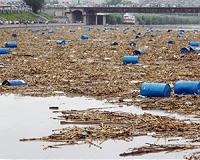| . |  |
. |
Geneva (AFP) Aug 1, 2010 A landmark international treaty to ban cluster munitions took effect on Sunday, requiring signatories to stop the use, production and transfer of the deadly weapons. Pope Benedict XVI hailed the ban and joined calls for all countries to sign up to the deal that also obliges those that have ratified it to destroy their stockpiles of the bombs. China, Russia, the United States and Israel are among those that have rejected the 2008 Convention on Cluster Munitions, ratified by around 37 countries and signed by 107. The big military powers that have not signed up are thought to hoard and manufacture the bulk of the munitions, although the data is secret. Campaigners including the Red Cross hope the moral weight of the treaty will persuade them to sign up. Sunday's milestone "stigmatises the use of cluster munitions," said International Committee of the Red Cross chief Jakob Kellenberger. "We hope that the entry into force will also affect the practice of states that have not yet adhered to the treaty," he said. The United States alone accounts for cluster bombs or shells containing around 800 million bomblets, according to the Cluster Munition Coalition, citing US congressional records. The munitions split open before impact and scatter multiple -- often hundreds -- of smaller submunitions, or plastic bomblets, the size and shape of a tennis ball or a table lighter over a wide area. Many of them fail to explode immediately and can lie hidden for years, killing and maiming civilians, including children, even decades after the original conflict is over in countries such as Laos, Cambodia and Vietnam. In Laos, which will host the first meeting of the convention in November, some 300 people are still hit every year by cluster bombs dating to the Vietnam war, according to the coalition. "My first thoughts go to the numerous victims who have suffered and continue to suffer serious physical and moral damage ... because of these insidious weapons," the pope said Sunday, welcoming the ban. "With the coming into force of the new treaty, which I urge all states to commit to, the international community has shown wisdom, clear-sightedness and perseverance to obtain a significant result in the area of disarmament and international humanitarian rights," he said. The Holy See is among the states to have ratified the convention. Other signatories include 22 out of 29 NATO members, notably Britain and Germany, which have an estimated 50 million cluster sub munitions each, as well as France. Thirty-seven countries have ratified so far.
Share This Article With Planet Earth
Related Links Our Polluted World and Cleaning It Up
 China rivers hit by flood-related chemical spills
China rivers hit by flood-related chemical spillsBeijing (AFP) Aug 1, 2010 Chinese officials said Sunday flood-related chemical spills had spread through major rivers, but added there had been little impact on water quality. Tests indicated highly-flammable chemicals had spread into northeastern Heilongjiang province after floods swept 7,000 chemical barrels into the Songhua River in neighbouring Jilin province, the official Xinhua news agency reported. Meanwhi ... read more |
|
| The content herein, unless otherwise known to be public domain, are Copyright 1995-2010 - SpaceDaily. AFP and UPI Wire Stories are copyright Agence France-Presse and United Press International. ESA Portal Reports are copyright European Space Agency. All NASA sourced material is public domain. Additional copyrights may apply in whole or part to other bona fide parties. Advertising does not imply endorsement,agreement or approval of any opinions, statements or information provided by SpaceDaily on any Web page published or hosted by SpaceDaily. Privacy Statement |